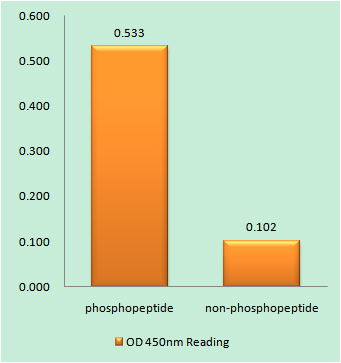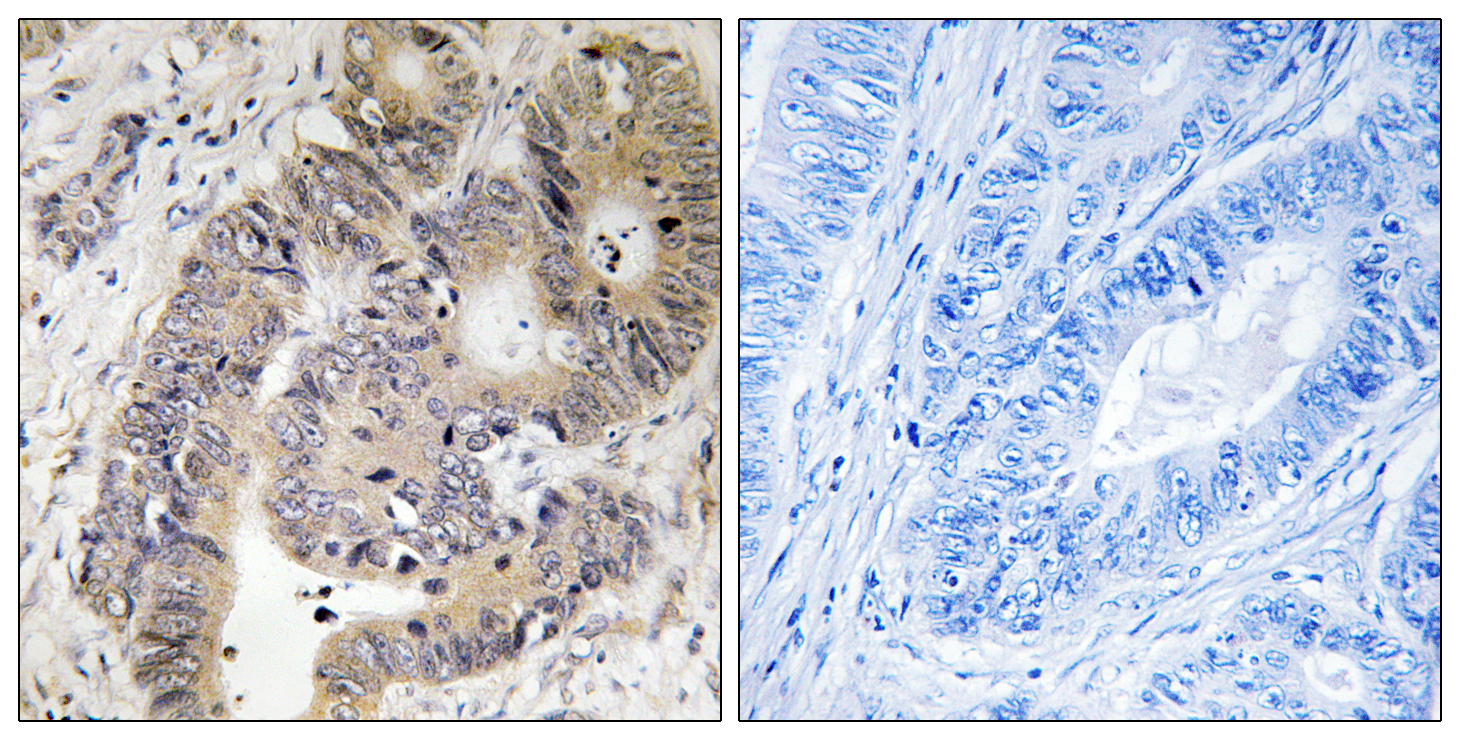CAD (phospho Thr456) Polyclonal Antibody
- Catalog No.:YP1083
- Applications:IHC;IF;ELISA
- Reactivity:Human;Mouse
- Target:
- CAD
- Fields:
- >>Pyrimidine metabolism;>>Alanine, aspartate and glutamate metabolism;>>Metabolic pathways;>>Biosynthesis of cofactors
- Gene Name:
- CAD
- Protein Name:
- CAD protein
- Human Gene Id:
- 790
- Human Swiss Prot No:
- P27708
- Immunogen:
- The antiserum was produced against synthesized peptide derived from human CAD around the phosphorylation site of Thr456. AA range:422-471
- Specificity:
- Phospho-CAD (T456) Polyclonal Antibody detects endogenous levels of CAD protein only when phosphorylated at T456.
- Formulation:
- Liquid in PBS containing 50% glycerol, 0.5% BSA and 0.02% sodium azide.
- Source:
- Polyclonal, Rabbit,IgG
- Dilution:
- IHC 1:100 - 1:300. ELISA: 1:5000.. IF 1:50-200
- Purification:
- The antibody was affinity-purified from rabbit antiserum by affinity-chromatography using epitope-specific immunogen.
- Concentration:
- 1 mg/ml
- Storage Stability:
- -15°C to -25°C/1 year(Do not lower than -25°C)
- Other Name:
- CAD;CAD protein
- Molecular Weight(Da):
- 243kD
- Background:
- The de novo synthesis of pyrimidine nucleotides is required for mammalian cells to proliferate. This gene encodes a trifunctional protein which is associated with the enzymatic activities of the first 3 enzymes in the 6-step pathway of pyrimidine biosynthesis: carbamoylphosphate synthetase (CPS II), aspartate transcarbamoylase, and dihydroorotase. This protein is regulated by the mitogen-activated protein kinase (MAPK) cascade, which indicates a direct link between activation of the MAPK cascade and de novo biosynthesis of pyrimidine nucleotides. Alternative splicing results in multiple transcript variants encoding different isoforms. [provided by RefSeq, Apr 2015],
- Function:
- catalytic activity:(S)-dihydroorotate + H(2)O = N-carbamoyl-L-aspartate.,catalytic activity:2 ATP + L-glutamine + HCO(3)(-) + H(2)O = 2 ADP + phosphate + L-glutamate + carbamoyl phosphate.,catalytic activity:Carbamoyl phosphate + L-aspartate = phosphate + N-carbamoyl-L-aspartate.,cofactor:Binds 1 zinc ion per subunit (for dihydroorotase activity) .,enzyme regulation:Allosterically regulated and controlled by phosphorylation. 5-phosphoribose 1-diphosphate is an activator while UMP is an inhibitor of the CPSase reaction.,function:This protein is a "fusion" protein encoding four enzymatic activities of the pyrimidine pathway (GATase, CPSase, ATCase and DHOase).,miscellaneous:GATase (glutamine amidotransferase) and CPSase (carbamoyl phosphate synthase) form together the glutamine-dependent CPSase (GD-CPSase) (EC 6.3.5.5).,online information:Aspartate carbamoyltransferase entry,pathway:Pyrimi
- Subcellular Location:
- Cytoplasm . Nucleus . Cytosolic and unphosphorylated in resting cells, translocates to the nucleus in response to EGF stimulation, nuclear import promotes optimal cell growth.
- Expression:
- Colon adenocarcinoma,Epithe
- June 19-2018
- WESTERN IMMUNOBLOTTING PROTOCOL
- June 19-2018
- IMMUNOHISTOCHEMISTRY-PARAFFIN PROTOCOL
- June 19-2018
- IMMUNOFLUORESCENCE PROTOCOL
- September 08-2020
- FLOW-CYTOMEYRT-PROTOCOL
- May 20-2022
- Cell-Based ELISA│解您多样本WB检测之困扰
- July 13-2018
- CELL-BASED-ELISA-PROTOCOL-FOR-ACETYL-PROTEIN
- July 13-2018
- CELL-BASED-ELISA-PROTOCOL-FOR-PHOSPHO-PROTEIN
- July 13-2018
- Antibody-FAQs
- Products Images

- Enzyme-Linked Immunosorbent Assay (Phospho-ELISA) for Immunogen Phosphopeptide (Phospho-left) and Non-Phosphopeptide (Phospho-right), using CAD (Phospho-Thr456) Antibody

- Immunohistochemistry analysis of paraffin-embedded human colon carcinoma, using CAD (Phospho-Thr456) Antibody. The picture on the right is blocked with the phospho peptide.



